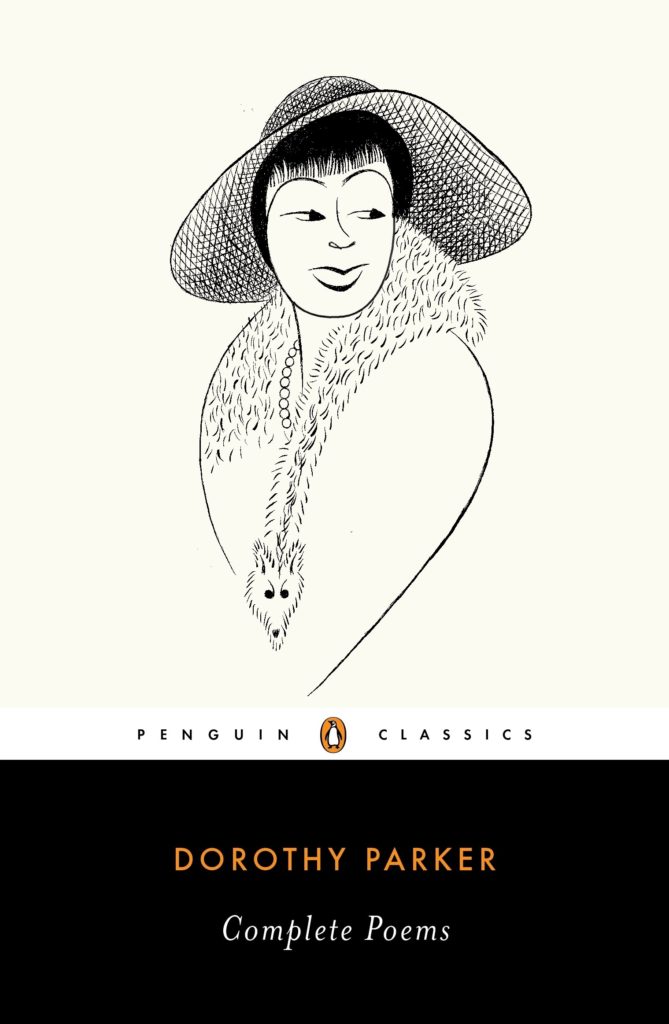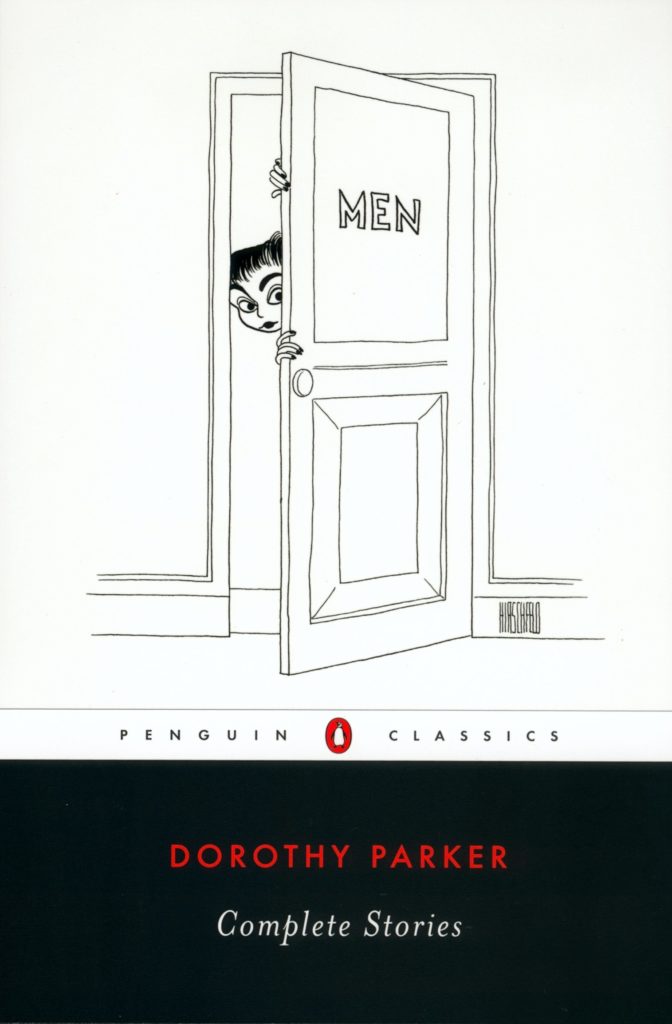About
Dorothy Parker (née Rothschild) was born on August 22nd, 1893, in West End, New Jersey to Henry Rothschild and Eliza A. Marston, who were respectively Jewish and Protestant. Parker underwent a tumultuous childhood, having lost her mother at the age of 4, her stepmother at the age of 10, and her uncle in 1912 to the Titanic. She was sent to various private and boarding schools where she was frequently reprimanded for bad behavior up until the age of 14, when she stopped attending classes.
When Parker’s father died in 1913, she began working as a pianist and submitting her verse to local newspapers in order to support herself. She published her poem “Any Porch” with Vanity Fair in 1914, which launched her illustrious career as a writer, poet, editor, playwright, and critic. She then took a copywriting job with Vogue, and was promoted to drama critic in 1917. She was admired and regarded for her scathing wit, devastating reviews, and bold honesty amongst her readers, but was so scorned by powerful producers and actors, that she was fired in 1920.
Meanwhile, she became a part of a group of drama critics, playwrights, editors, poets, and writers that met every week at the Algonquin Hotel. They were coined “The Algonquin Round Table” and called themselves “The Vicious Circle”, because of their scathing wit and intellectual commentary. During the beginning of her career, Parker wrote and published various short stories reviews, poems, and journals, notably, as a part of the editorial staff for The New Yorker under the “Constant Reader” section.
Her most well-known literary contributions were her popular books of verse, Enough Rope (1926), Sunset Gun (1928), and Death and Taxes (1931). She also won the O. Henry award for her autobiographical short story, “Big Blonde”, in 1929, and subsequently published collections of her various fictional works and short stories. Later in her career, she wrote various plays, screenwrites, and lyrics for musicals such as “Candide”. She eventually became a screenwriter for MGM and Paramount with her then-husband, Alan Campbell, the highlight of which was her Academy Award nomination for A Star is Born in 1937. As Parker got older, she began to write less, but was inducted into the American Academy of Arts and Letters in 1959, and served as a professor at California State College in Los Angeles in 1963.
Throughout her life, Parker struggled with depression, alcoholism, and attempted suicide twice, the first time being in 1923. She had various partners throughout her life, but none of her relationships or marriages resulted in children. Parker also travelled to Europe frequently during the 1920’s, and befriended Ernest Hemingway, F. Scott Fitzgerald, and the socialites Gerald and Sara Murphy, becoming a socialite herself. Parker held far-left ideals throughout her entire life and became a socialist in 1927, which eventually caused her to be called before The House on Un-American Activities in 1955. Parker was committed to social justice, racial equality, feminism, and civil rights throughout her life, and left her entire literary estate to Dr. Martin Luther King Jr. upon her death on June 7th, 1967. Her ashes are monumentalized in Washington, D. C. at the NAACP headquarters.
Dorothy Parker’s legacy continues to be one of successfully searing wit and cheeky intelligence in the face of adversity. She explored themes of feminism and equality, questioning gender roles and highlighting the American women’s experience with biting, satirical honesty during a time in which that was not usually condoned. The themes in her writing are universally relevant today, and still resonate with countless people through the immortalization of her poetry, short stories, reviews, screenplays, and in musical settings of her prose and poetry.
– Uma Singh
“Biography.” Dorothy Parker Society, dorothyparker.com/gallery/biography.
“About Dorothy Parker.” Poets.org, https://poets.org/poet/dorothy-parker
Related Information
Songs
A Horse With Wings
Song CollectionRicky Ian Gordon
Emily Dickinson
Ricky Ian Gordon
John Hollander
Edna St. Vincent Millay
Frank O’Hara
Dorothy Parker
Before the Storm
Song CollectionJake Heggie
Emily Dickinson
Edna St. Vincent Millay
Dorothy Parker
Enough Rope
Song CollectionJohn Musto
Dorothy Parker
Four Songs
Song CollectionEmma Lou Diemer
James Joyce
Dorothy Parker
The Red Dress
Ricky Ian Gordon
Dorothy Parker
Song Collection: A Horse With Wings
The Waltz
Lee Hoiby
Dorothy Parker
Song Collection: Three Women
The Thin Edge
Jake Heggie
Dorothy Parker
Song Collection: Before the Storm
Songs of Perfect Propriety
Song CollectionSeymour Barab
Dorothy Parker
Books

Complete Poems (Dorothy Parker)

Complete Stories (Dorothy Parker)

Enough Rope
Dorothy Parker's first book of published poetry, from 1926.

Not Much Fun: The Lost Poems of Dorothy Parker
Poems from throughout Dorothy Parker's life that weren't published in her three original collections of poems.

Big Blonde and Other Stories
Dorothy Parker's first book of short stories.
Sheet Music
A Horse With Wings
Composer(s): Ricky Ian Gordon
Song(s): Once I Was
Sweet Song
Afternoon on a Hill
My Sister's New Red Hat
A Horse with Wings
Air
Poem (Lana Turner has Collapsed)
The Lake Isle of Innisfree
The Spring and the Fall
Souvenir
Coyotes
The Red Dress
What Shall We Remember?
Will There Really Be a Morning?
Sycamore Trees
Fewer Words
The Special Picnic
Janet Underneath the Roses
I am a Cherry Alive
An Old-Fashioned Song
White Haired Woman
Songs of Perfect Propriety (vol. 1)
Composer(s): Seymour Barab
Song(s): Song of Perfect Propriety, Now at Liberty, Ultimatum, Renunciation, Inventory, Social Note, A Very Short Song, One Perfect Rose, Wisdom, Men, Lullaby, Comment
Voice Type: medium- high
Buy via Hal LeonardSongs of Perfect Propriety (vol. 2)
Composer(s): Seymour Barab
Song(s): Symptom Recital, The False Friends, Love Song, Indian Summer, Somebody's Song, Song of One of the Girls, Bri-a-Brac, They Part, Chant for Dark Hours, The Choice, The Trusting Heart, Coda
Voice Type: medium- high
Buy via Hal Leonard
